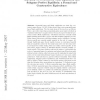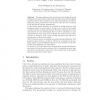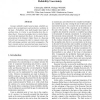662 search results - page 6 / 133 » Formalizing Basic First Order Model Theory |
126
click to vote
CORR
2007
Springer
15 years 2 months ago
2007
Springer
Abstract. Sequential game and Nash equilibrium are basic key concepts in game theory. In 1953, Kuhn showed that every sequential game has a Nash equilibrium. The two main steps of ...
148
click to vote
LORI
2009
Springer
15 years 8 months ago
2009
Springer
Arrow’s Theorem is a central result in social choice theory. It states that, under certain natural conditions, it is impossible to aggregate the preferences of a finite set of i...
112
click to vote
FLAIRS
2001
15 years 3 months ago
2001
A knowledge base is maintained by modifying its conceptual model and by using those modifications to specify changes to its implementation. The maintenance problem is to determine...
127
click to vote
TPHOL
2003
IEEE
15 years 7 months ago
2003
IEEE
This paper addresses the crucial issue in the design of a proof development system of how to deal with partial functions and the related question of how to treat undefined terms. ...
IEEEARES
2006
IEEE
15 years 8 months ago
2006
IEEE
In many reliability studies based on data, reliability engineers face incompleteness and incoherency problems in the data. Probabilistic tools badly handle these kinds of problems...



